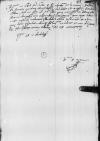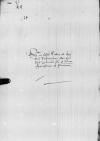Letter #1940
Ioannes DANTISCUS to Tiedemann GIESEHeilsberg (Lidzbark), 1538-10-14, postscript 1538-10-17
English register:
Through the tailor, Dantiscus is sending Giese the records [acta] as well as the cope and other items. The records are lacking the acta of the latest Marienburg (Malbork) Diet, which was in session in Dantiscus’ absence. Dantiscus asks that the acta be entered in his register.
Acceding to Giese’s recommendation, he has decided to grant the Guttstadt (Dobre Miasto) canonry not to his chaplain but to the parish priest of Dietrichswalde (Gietrzwałd) [Simon Hecht], whom he is summoning.
Manuscript sources:
Prints:
| ||||||
Text & apparatus & commentary Plain text Text & commentary Text & apparatus
Reverendissimo in Christo Patri et Domino, domino
Reverendissime in Christo Pater, amice et frater carissime ac honorande.
Salutem et sinceri amoris commendationem.
Reddet Dominationi Vestrae Reverendissimae
Ex
Reverendissimae Dominationi Vestrae deditissimus
Postscript:
Novissime Dominationi Vestrae Reverendissimae scripsi canonicatum Gutstatensem me
Ex
[1 ] Fulfilling the request of Giese, Dantiscus lends him his own register of acta of the


